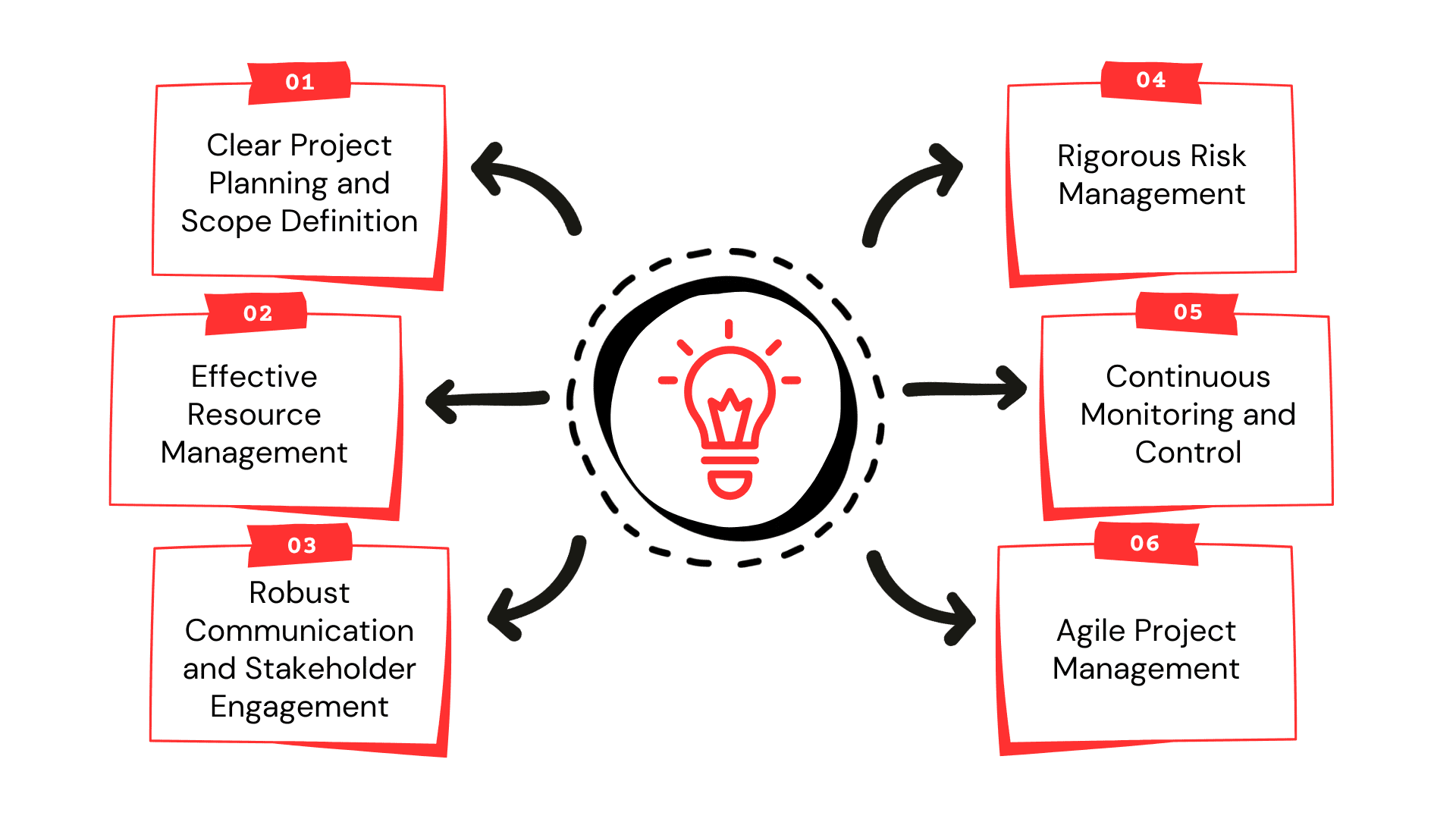
Home »
Impact of Project Management on Organizational Performance
Explore how effective project management profoundly impacts organizational performance.
Introduction
Effective project management plays a crucial role in the success and performance of organizations across various industries. As organizations face increasing complexities, dynamic market conditions, and evolving customer demands, the ability to manage projects efficiently and effectively becomes paramount.
The impact of project management on organizational performance has gained significant attention as businesses strive to achieve their strategic objectives and remain competitive in a rapidly changing landscape.
The purpose of this article is to explore and analyze the influence of project management on organizational performance. By examining the relationship between project management practices and key performance indicators, this study aims to shed light on the significant role that PM plays in enhancing organizational success.
Project Management: An Overview
It is a discipline that involves planning, organizing, and controlling resources to achieve specific goals within a defined timeframe. It is a structured approach to managing projects, regardless of their size or complexity. It provides organizations with a framework to effectively initiate, plan, execute, monitor, and close projects, ensuring successful outcomes.
The key elements of this include defining project objectives, identifying project stakeholders, creating a project plan, allocating resources, managing risks, monitoring progress, and evaluating project outcomes. Project managers play a crucial role in leading and coordinating project teams, facilitating communication, managing budgets, and ensuring that projects are delivered on time and within scope.
Effective project management brings numerous benefits to organizations. It improves efficiency by optimizing resource utilization, streamlining processes, and minimizing delays and rework. It enables effective cost control by tracking expenses, managing budgets, and identifying cost-saving opportunities.
It also ensures quality assurance by setting quality standards, conducting inspections, and implementing quality control measures. Furthermore, it enhances customer satisfaction by delivering projects that meet or exceed expectations, resulting in positive customer experiences and long-term relationships.

Linking Project Management and Organizational Performance
Project management has a direct and substantial impact on organizational performance. Effective project management practices can significantly contribute to the achievement of strategic objectives, operational excellence, and overall organizational success. By aligning project management with organizational goals and objectives, organizations can maximize their performance in several key areas.
- Strategic Alignment: Project management ensures that projects are aligned with the strategic goals of the organization. By prioritizing projects that directly support the organization’s strategic objectives, resources can be allocated effectively, and efforts can be focused on projects that provide the most value.
- Efficiency and Productivity: Efficient project management practices improve operational efficiency and productivity. Effective planning, resource allocation, and task management help streamline project workflows, reduce bottlenecks, and eliminate unnecessary activities.
- Cost Control and Budget Management: Project management plays a crucial role in controlling costs and managing project budgets. Through diligent planning, estimating, and monitoring of project costs, project managers can identify potential cost overruns or deviations from the budget.
- Quality Assurance and Customer Satisfaction: Project management practices emphasize quality assurance throughout the project lifecycle. Robust project planning, quality control processes, and stakeholder engagement ensure that projects are delivered with the desired level of quality.
- Innovation and Competitive Advantage: Project management can foster innovation within organizations. By incorporating project management methodologies that encourage creativity, risk-taking, and continuous improvement, organizations can drive innovation initiatives.
- Stakeholder Engagement and Collaboration: Project management emphasizes stakeholder engagement and collaboration, which are vital for organizational success.
- Organizational Learning and Adaptability: Project management promotes a culture of learning and adaptability within organizations. Through project reviews, lessons learned, and knowledge sharing, organizations can continuously improve their project management practices.
Understanding Organizational Performance
Organizational performance refers to the ability of an organization to achieve its goals and objectives effectively and efficiently.
Financial Performance: Financial performance measures an organization’s ability to generate profits, manage costs, and achieve financial stability. Key financial performance indicators include revenue growth, profitability, return on investment (ROI), cash flow, and financial ratios.
Operational Performance: Operational performance focuses on the efficiency and effectiveness of an organization’s core processes and activities. It involves measuring and improving the organization’s operational capabilities, such as production efficiency, supply chain management, quality control, delivery timelines, and customer service.
Strategic Performance: Strategic performance assesses how well an organization executes its strategic initiatives and achieves its long-term objectives. It involves evaluating factors such as market share, market expansion, competitive positioning, innovation capabilities, and strategic partnerships.
Stakeholder Performance: Stakeholder performance examines the organization’s relationships and interactions with various stakeholders, including employees, customers, suppliers, investors, and the community. It involves assessing factors such as employee satisfaction, customer loyalty, supplier relationships, investor confidence, and corporate social responsibility initiatives.
Project Management and Organizational Performance: The Relationship
Project management and organizational performance share a significant and interconnected relationship. It ensures that projects are aligned with the organization’s strategic goals and objectives. By prioritizing projects that directly contribute to the organization’s mission and vision, it helps focus resources and efforts on initiatives that drive organizational performance.
Project management plays a crucial role in determining project success factors, such as meeting project deadlines, staying within budget, delivering quality outcomes, and satisfying stakeholder expectations. Successfully managing these factors enhances project performance, which directly contributes to overall organizational performance.
Effective project management optimizes the utilization of resources, including human resources, financial resources, and materials. By allocating resources efficiently, it maximizes productivity and minimizes waste, resulting in improved organizational performance.
It includes robust risk management practices that identify, assess, and mitigate risks throughout the project lifecycle. By effectively managing risks, project managers minimize potential disruptions, delays, and cost overruns, thereby positively impacting organizational performance.
Factors Influencing the Impact of Project Management
Strong leadership support and involvement are crucial for the success of project management initiatives.
A supportive organizational culture that values project management practices and encourages collaboration, innovation, and continuous improvement fosters a conducive environment for effective project management.
Engaging stakeholders throughout the project lifecycle is vital for project success and organizational performance. The competence and skills of project managers and project teams significantly influence the impact of project management on organizational performance.
The utilization of robust project management processes and methodologies contributes to the impact of project management on organizational performance.
The Benefits of Effective Project Management
- Improved Project Success Rates
- Enhanced Efficiency and Productivity
- Cost Control and Budget Management
- Quality Assurance
- Stakeholder Satisfaction
- Organizational Learning and Knowledge Management
These benefits highlight the importance of effective project management in achieving successful project outcomes, enhancing organizational performance, and maximizing value for stakeholders.

Challenges and Barriers to Effective Project Management
- Unclear Project Objectives
- Inadequate Resource Allocation
- Scope Creep and Changing Requirements
- Lack of Communication and Collaboration
- Risk and Issue Management
- Lack of Skills and Competencies
- Organizational Culture and Resistance to Change
- External Factors
Addressing these challenges and barriers requires proactive measures, such as establishing clear project objectives, allocating adequate resources, implementing effective communication channels, enhancing project management competencies, and fostering a supportive organizational culture.
| Challenges and Barriers: | Challenges and Barriers to Effective Project Management |
| Unclear Project Objectives | Unclear project objectives can hinder project success by causing confusion and misalignment among team members. |
| Inadequate Resource Allocation | Insufficient allocation of resources can lead to project delays, increased costs, and compromised quality of deliverables. |
| Scope Creep and Changing Requirements | Scope creep and changing requirements can disrupt project timelines and budgets, causing challenges in meeting project goals. |
| Lack of Communication and Collaboration | Poor communication and collaboration can result in misunderstandings, delays, and reduced overall project effectiveness. |
| Risk and Issue Management | Inadequate management of risks and issues can lead to unforeseen problems that jeopardize project progress and outcomes. |
| Lack of Skills and Competencies | Insufficient project management skills and competencies can hinder effective decision-making and hinder project success. |
| Organizational Culture and Resistance to Change | Organizational culture and resistance to change can impede the adoption of new project management practices and processes. |
| External Factors | External factors such as market changes or regulatory shifts can impact project timelines, resources, and objectives. |
Strategies for Optimizing Project Management
Collaboration in project management can face various challenges, especially when teams are distributed or working remotely. However, by proactively addressing these challenges, you can foster effective collaboration and overcome obstacles. Here are some common collaboration challenges and strategies to overcome them:
- Lack of Trust and Engagement: Building trust and fostering engagement is crucial for effective collaboration. Encourage regular team interactions, both formal and informal, to build relationships and camaraderie. Recognize and appreciate individual and team achievements.
- Document and Knowledge Sharing: Effective document and knowledge sharing are essential for collaboration. Utilize project management software to centralize project documents, templates, and resources. Implement version control to ensure everyone has access to the latest information. Encourage team members to share their expertise and document best practices.
- Task and Responsibility Clarity: Lack of clarity regarding tasks and responsibilities can lead to confusion and duplication of effort. Clearly define project roles and responsibilities, and communicate them to the team.
- Balancing Autonomy and Collaboration: Finding the right balance between individual autonomy and collaboration is important. Encourage individual accountability while fostering collaboration and teamwork.
- Technology Challenges: Technical issues or limitations with collaboration tools can hinder effective collaboration. Ensure that team members have access to reliable and user-friendly collaboration tools. Provide training and support to ensure everyone can effectively use the tools.
- Regular Evaluation and Feedback: Continuously evaluate the collaboration process and seek feedback from team members. Regularly assess the effectiveness of communication channels, collaboration tools, and team dynamics.

KEBS – Project Management Software
KEBS Project Management addresses the challenges of effective project management with its powerful features:
- Clear Project Planning and Scope Definition: KEBS provides a comprehensive project planning module where you can define clear objectives, scope, and deliverables. This feature helps eliminate the challenge of unclear project objectives and ensures that everyone involved understands the project’s scope and goals.
- Resource Management: With KEBS, you can efficiently allocate and manage project resources. The platform allows you to assign resources to tasks, track resource availability, and optimize resource allocation. This feature helps address the challenge of inadequate resource allocation, ensuring that projects have the necessary resources for successful execution.
- Integration with Third-Party Apps: KEBS seamlessly integrates with third-party apps, allowing you to import data and streamline project management processes. This integration feature addresses the challenge of data silos and facilitates a smooth transition from existing project management tools, enabling a more efficient and unified project management ecosystem.
- Reporting and Analytics: KEBS provides robust reporting and analytics capabilities, allowing you to generate project progress reports, track key performance indicators (KPIs), and gain insights into project performance. This feature addresses the challenge of limited visibility into project progress and performance, enabling data-driven decision-making and timely corrective actions.
By incorporating these features, KEBS Project Management addresses the challenges faced in project management, empowering organizations to overcome obstacles and achieve successful project outcomes.
| KEBS – Project Management Software: | Empower Your Projects with KEBS Project Management: |
| Clear Project Planning | Define objectives, scope, and deliverables efficiently. Eliminate unclear project objectives. |
| Resource Management | Allocate, track, and optimize project resources effectively. Address inadequate resource allocation. |
| Integration with Third-Party Apps | Seamlessly integrate with third-party apps for data flow and unified project management. |
| Reporting and Analytics | Generate progress reports, track KPIs, and gain insights for informed decision-making. |
Conclusion
In conclusion, collaborative project management supported by powerful software platforms like KEBS offers significant advantages and opportunities for organizations. The features and capabilities provided by KEBS enable effective communication, seamless collaboration, and efficient project execution.
Furthermore, KEBS addresses the need for real-time monitoring of productivity, enabling teams to track individual and collective contributions. The software’s resource collaboration features foster teamwork and facilitate efficient communication, even in remote settings.
Take your organization to the next level!









